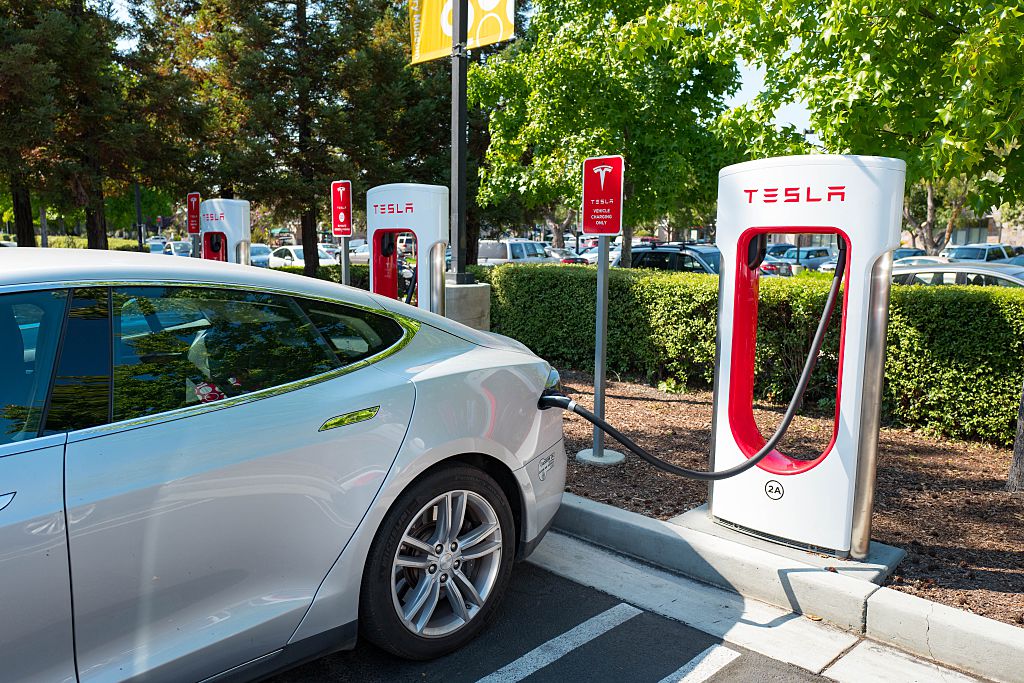Some Tesla owners are getting a charge they never expected.
Owners of the electric automobile might seem to be a community of like-minded people — with money to spend and a willingness to adopt the EV lifestyle regardless of its evident pitfalls.
But when it comes to Tesla owners who abuse the company’s Supercharger power stations, there’s no camaraderie to be found — just a sneaky way of getting revenge.
According to InsideEVs, a publication dedicated to the electric vehicle business, Tesla vigilantes are meting out their version of justice to Tesla drivers who use Tesla Supercharging stations as personal parking lots without even getting juice.
Deciding to make a parking spot out of a site dedicated to power purposes, it turns out, is a great way of making other Tesla drivers angry.
See, when a car is taking up a spot just parking there, it obviously makes it that much more difficult for everyone else to repower their batteries. And that makes some Tesla drivers — who already deal with charging times ranging from 15 minutes to more than an hour, according to the consumer reviews website SolarReviews — very unhappy.
And they know how to get even: by plugging the offending vehicle into the charging station. If the vehicle is fully charged, Tesla will begin charging idling fees of either 50 cents or $1 per minute for as long as the situation lasts.
Found someone else who’s parked without charging, since they “forgot” to plug in I plugged it in for them so they can get some idle fees since there’s a 5 car line. Love helping the community. pic.twitter.com/QPKRf5cNff
— Zack (@BLKMDL3) January 21, 2023
It probably comes as a surprise to non-Tesla owners, but it’s apparently a piece of cake for any passerby to open a Tesla’s charge port.
For those wondering, yes you can open the charge port of a locked 3/Y by pressing the button on the charger. It worked. Good deed done for the day! pic.twitter.com/i6Lh9amX2U
— Zack (@BLKMDL3) January 22, 2023
To be clear, this isn’t a tactic aimed at someone who simply left a vehicle plugged in and got caught up in other business while charging continued. Tesla drivers receive a notification when their vehicles are almost fully powered, then another notification when they’re powered.
This involves Teslas that aren’t plugged in in the first place — where the spot is simply being used as a convenient place to park.
When other Tesla drivers get miffed and decide to plug the offending car in, it can get expensive, fast. When a battery is full, the company starts to impose “idle fees” of either 50 cents per minute or $1 per minute if all charging ports at a charging station are in use.
The fees were introduced in 2018.
Tesla increases Supercharger idle fees to improve wait times | by @fredericlambert https://t.co/FB02yYgkzG pic.twitter.com/VkFRt6JrnB
— Electrek.co (@ElectrekCo) September 20, 2018
The fees weren’t designed to make money for the company, according to a Tesla statement, but to act as an incentive for drivers not to use charging stations as their personal lots. They don’t kick in unless half or more of a Supercharger station’s available spots are full.
“Idle fees only apply when a Supercharger station is at 50% capacity or more. Idle fees double when the station is at 100% capacity. To be clear, this is purely about increasing customer happiness and we hope to never make any money from it,” the company states.
(Well, the way things have been going at Tesla lately, finding another way to make money might not be all that bad of an idea.)
“A customer would never leave a car parked by the pump at a gas station and the same thinking applies with Superchargers,” the statement notes.
Amen to that. For a driver to leave a gas-powered car unattended at a gas pump would be unthinkable.
The constant, fluid motion that surrounds a busy gas station would make that impossible at peak hours. The personal contact involved in filling up a tank of gas, which keeps the motorist and vehicle together for whatever number of minutes until the task is completed, makes it almost inconceivable the vehicle could be abandoned. Where are you going to go without your car, anyway?
Lines at gas stations happen, of course. Any successful business is going to have times of heavy demand, and customers are going to be behind fellow patrons at least some times.
But the idea of an interminable wait of even 15 minutes on a regular basis — much less of more than an hour — to fill up the tank of a gas-powered vehicle isn’t a part of most Americans’ lifestyle.
Tesla drivers clearly have to be a patient lot when it comes to charging their vehicles. But it looks like some can lose patience with their peers.
This article appeared originally on The Western Journal.
























 Continue with Google
Continue with Google